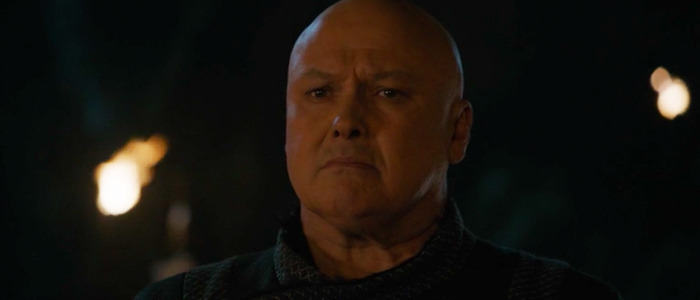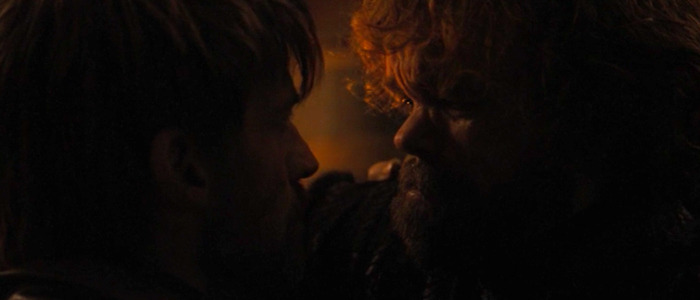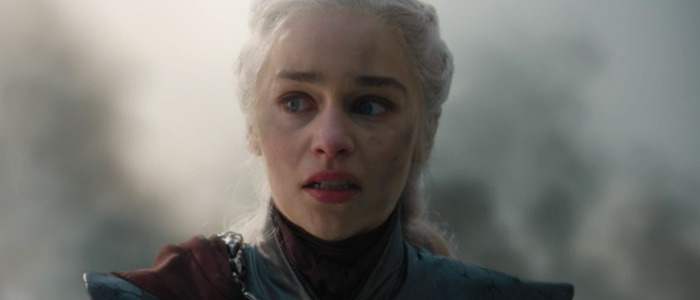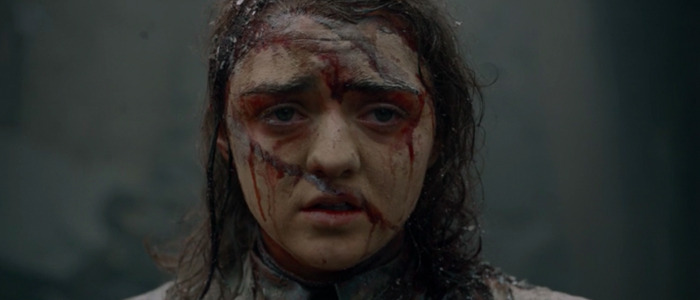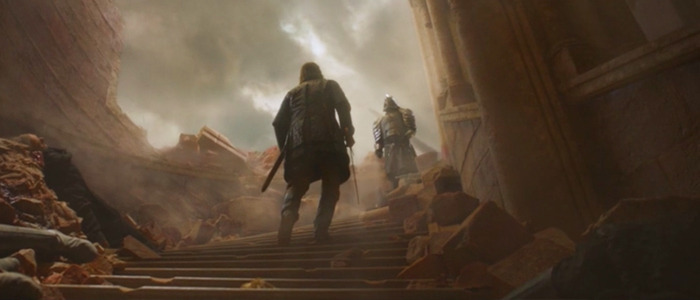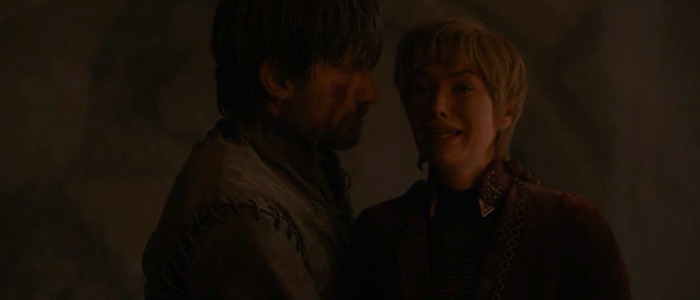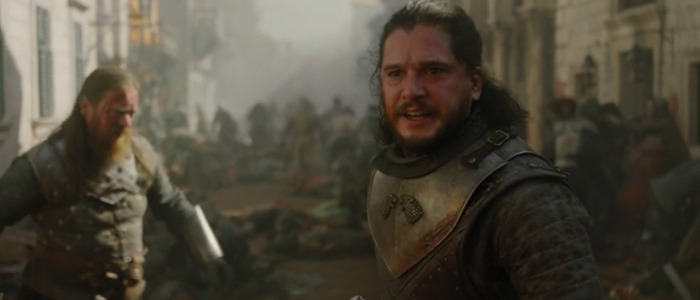'Game Of Thrones' Delivers Its Most Divisive And Apocalyptic Episode With "The Bells"
Well, that was certainly a thing.
The penultimate episode of Game of Thrones, titled "The Bells," somehow managed to be more apocalyptic than the episode with the battle against the literal army of the dead. The body count was massive. Characters made ugly and horrible decisions. The landscape of Westeros was forever altered. And there is still one episode left.
/Film's resident Game of Thrones experts Jacob Hall and Ben Pearson sat down to pick this episode apart and sort through the bodies and the rubble. What happened here? What comes next?
Varys
Jacob: Varys has been saying it since season 1 – he serves the realm. And while it took some people an awfully long time to believe him, he's always been truthful about his overall intentions when he revealed the cards held closest to his vest. He doesn't back a particular ideology. He serves no region or House. The Spider has been the only man with any power in Westeros to truly look at the forgotten folks, the peasants, the ordinary people caught in the wars between kings, and work to better their lives. And considering the state of Westeros when the show began, could you blame him for secretly backing the return of the Targaryens?
Of course, we've seen his faith waver this season. Perhaps it saw its first crack when Daenerys Targaryen threatened his life during their first consequential dialogue scene in season 7, but it was shattered in "The Last of the Starks" when the truth about Jon Snow's parentage was revealed and Westeros' top spy plotted his final and most dangerous betrayal. But Tyrion, still faithful to the Mother of Dragons, sold his colleague out. How sad it was to see Varys hear approaching footsteps and calmly remove his rings and burn his letters, knowing what was coming. How despairing it was to watch him led to the shores of Dragonstone before Daenerys and Jon Snow. How heartbreaking it was to see Tyrion admit that he sold him out and for Varys to not only acknowledge it, but understand and accept the decision of his old friend, colleague, and traveling partner. More than any other player in the game of thrones, Varys knows the rules and he knows the consequences and he knows what happens when you lose. His acceptance of his fate, his understanding of Tyrion's choice, was a quietly shattering moment in an episode filled with bombast and blood.
Ben, I've long held Varys in high regard. He's straight-up one of the best characters on the show and Conleth Hill has always been a joy to watch. But he was always doomed, right? Despite his shadowy nature, he was ultimately the only person fully working on the side of good and the only person willing to make the hardest possible choices in the name of ending wars, preventing bloodshed, and keeping the realm, and its millions of inhabitants, alive. He was the hero Westeros needed, but not the one it deserves. Watching him getting roasted to death by dragons was the first big clue that "The Bells" was not going to take any prisoners. How did you react to this sequence?
Ben: I honestly never considered Varys to be doomed, for exactly the reason you just laid out: he's the one person who genuinely puts the interests of the realm above everything else. I figured his unfailing devotion would result in him being one of the few players to survive this series and oversee a new reign in Westeros...but I must have forgotten what show I was watching. The world doesn't care about justifications. Every character is at the mercy of their rulers, and Varys happens to be at the mercy of one who isn't in a mercy-granting mood. The world doesn't care about justifications, and Dany doesn't care about any good intentions that may have been behind her betrayal. So RIP, Varys. And you better believe that because Dany viewed Varys's actions as the direct result of a betrayal by Jon Snow, the two former lovers are heading toward a reckoning in the finale.
The Lannister Brothers
Ben: Tyrion's been waiting almost four seasons to have the chance to pay Jaime back for aiding his escape in the season four finale, and he finally gets his opportunity when Jaime's been captured outside of King's Landing. Tyrion's plan for Jaime and Cersei to flee to Pentos is full of desperation, and both Lannister brothers know in their hearts it won't work.
And I don't know about you, Jacob, but their tearful goodbye worked for me. Tyrion reminding the audience that Jaime was the only one who cared for him during their childhood may seem like a forced callback, but for me, it highlighted how these are two characters who, despite some of their twisted previous actions, are opposed to cruelty. Naturally, they've each had their own problematic exceptions to that notion, but at this point in the show, it's basically all coming down to one question: should King's Landing burn, or shouldn't it? Both brothers know the right answer, but the trouble is they're both drawn to powerful women who don't have the same level of scruples.
What did you think about the final meeting between these two characters?
Jacob: I don't think it was forced at all. Tyrion may have begun the show as a drunken lout, but we've learned over the past eight years that he's a fragile, warm soul and a kind man who remembers favors and rewards loyalty. Whether his plan for Jaime to abscond with Cersei and surrender the city works or not, he knows one thing for certain: this is the last time the two of them will see one another. He's pinning his hopes for peace, and the lives of countless innocents, on a brotherly bond he has always believed in, one that is powerful enough to cut through politics and the rivers of blood that surround House Lannister. At the end of the day, as established early and often since the pilot episode, Tyrion and Jaime love one another. Full-stop. No questions asked. If the show didn't pause for this farewell, this final interaction, it would have been doing them a disservice. Jaime is too broken to take credit for his good deeds, but we can count among them keeping Tyrion alive in a world designed to break him and kill him.
Daenerys, War Criminal
Ben: Did you hear the resigned nature in Dany's voice when she executed Varys? She took no pleasure in that act. There was no righteous vengeance in her tone. In that moment, more than anyone else, Dany reminded me of Ned Stark, the honorable man who explained to his sons in the show's first episode that they ought to be the ones to swing the sword during executions. Killing Varys was the act of a woman who long ago accepted that collateral damage would be necessary in her quest to regain the throne she views as rightfully hers.
So for me, it wasn't shocking to see her take that mentality to the next level by setting King's Landing aflame, even after the bells of surrender rang out across the city. She's had everything ripped away from her – not just the throne and her entire childhood, but the people closest to her – so while I obviously don't agree with her decision to burn thousands of innocent people, the show has laid plenty of track to get us to that moment. (And I thought director Miguel Sapochnik, much maligned online for directing the admittedly-hard-to-see Battle of Winterfell episode, directed the hell out of this episode and left nothing to the imagination this time.)
What did you think about the way the episode handled Dany's big decision?
Jacob: Game of Thrones, and George R.R. Martin's original A Song of Ice and Fire novels, always bring to mind a quote attributed to Napoleon Bonaparte: "History is a set of lies agreed upon." The tales told, the songs sung, and textbooks written come years after the blood has been shed and the smoke has cleared. What is truth, what is forgotten, and what gets remembered is decided upon those who shake hands, agree on the version of the tale that is suitable for print, and move on to further polish the rough spots out of their legacies.
Daenerys' brutal evisceration of King's Landing begins heroically enough. No longer under assault in an ambush, she is able to destroy the dragon-killing Scorpion siege weapons. She burns the Iron Fleet. She roasts the Golden Company. She tears down the walls and front gates of the city, allowing the Unsullied, the Dothraki, and the Northern forces immediate entry. It's another fist-pumping moment. Another victory for the Dragon Queen. Another conquest for our hero.
Except that Daenerys is not the hero of battle. She's the villain. She's the monster we've all been worried about. Remember that she burnt a woman to death for betraying her in season 1. Remember that she locked two people in a safe to starve to death in season 2. Remember that she sacked cities and killed countless people as part of a moral crusade that led to unresolved civil unrest across an entire region. But we cheered her on. Because she was the plucky heroine, the young woman who rose up against a corrupt world, said "No" and burned the old order to the ground. We cheered on acts of incredible violence and destruction because it felt right. Because we were on the ground with her. Because we were asked to sit in her righteous point-of-view.
Remember how she was greeted when she conquered Meereen? A crowd of thousands greeted her at the gate, having forcefully overthrown the city leadership upon her arrival. They lifted her above their heads, called her mother, and declared her their new ruler. A reception for a proper queen, especially one with a trio of dragons and the most famous name in several continents. A reception in line with the tales she was fed from a young age: that the people of Westeros secretly toasted the Targaryen line, eagerly awaited their return, and would offer their swords and vows the moment she set foot in the Seven Kingdoms again. And since her arrival in Dragonstone last season, none of these promises have come true. She's walked into a quagmire where few houses are ready to commit. The queen in the South wants to destroy her. The king in the North is more worried about an invasion of the undead. And the people? As we have glimpsed throughout the season, the people are skeptical at best. They want to know how they will eat this winter. They have no interest in bowing before a queen they have never seen and her foreign army.
Perhaps the speedy pacing of this season did this transition a disservice on some levels, but the seeds were all there. A woman expecting a kingdom to fold over and place a crown on her head within moments of arrival instead finds it disinterested and hostile. There exists a secret Targaryen with a better claim to the throne. Her advisors are proving less than useful and her most trusted confidants, her moral compasses (not to mention two of her dragons) die awful deaths. For years, Daenerys has threatened to burn cities to the ground and destroy all who oppose her. For seasons, we took that as the badass posturing of a hero with a moral agenda, not a dangerous woman whose worst impulses require constant checks (and Jon Snow may be many things, but his backbone is awfully brittle when it comes to standing up to her).
And so Daenerys Targaryen overlooks a helpless and mostly defenseless King's Landing, a city of a million people (plus countless thousands of refugees) who have not welcomed her with open arms. A city of a million people who flocked within the walls, within the protection of Queen Cersei, rather than call her "Mhysa." Daenerys did not find the love she was promised, nor the easy campaign she expected. So when she sits there, fuming and bitter and thinking that the only way to win the respect of the Seven Kingdoms is fear because love certainly isn't going to enter into it, she makes an awful choice. An unforgivable choice. She destroys the city. She destroys the Red Keep. She massacres countless innocent people because she is Daenerys of House Targaryen and her House is that of fire and blood.
I know I'm going long here, Ben. But Napoleon called history a lie agreed upon and after witnessing Daenerys transform into the monster that others have worried she would become for years and years, my mind scrambled to think of how the maesters will record this one. Maybe the series ends with her on the Iron Throne and the stories tell of the brave Dragon Queen who led a glorious battle after freeing the slaves across the Narrow Sea, omitting the burning families in the streets and the casual disregard for those bells of surrender – because what kind of glorious queen commits such crimes against her own people? Or maybe the series ends with Daenerys dead or imprisoned and the songs tell of the Mad Queen, who massacred entire cities in Essos before turning her rage on King's Landing, and this version omits her hard-won triumphs, her noble goals, her friendships and romances and everything that made her so human, everything that made us want to be on her side before she made this terrible and unforgivable choice to choose fear above all else.
In either case, we lose half the story. In either case, the tale of Daenerys Targaryen is a tragedy. It's a betrayal. A punch to the gut. A reminder that history is written by the winners with the blood of the losers. And we are the only witnesses to the whole story.
Arya in the Streets
Ben: There was a several-year period a few years ago where it seemed as if every major action movie utilized 9/11 imagery. I think the movies have eased up on that a bit recently, but the visual parallels in this Game of Thrones episode were hard to ignore: fire, ash, and blood filled the streets as the city crumbled, all captured by cameras at ground level as terror reigned from above. I'm guessing the decision to approach the scene this way will be controversial, and I wouldn't be surprised if many people think it makes the episode feel too modern.
But I thought it was well-executed, and it was nice to follow Arya as a POV character for a change during one of the episode's big moments; it's usually Jon who takes center stage at times like these, and we've followed Jon enough times that it's no longer interesting. Arya, however – especially in the wake of her revelation from Sandor "The Hound" Clegane not to spend the rest of her life in pursuit of vengeance – offered the perfect perspective point here, putting her own interests aside to try to help a group of civilians escape. Do you think the fact that she failed will have any noticeable effect on her psyche in the finale? She seemed pretty dazed there at the end.
Jacob: This sequence offered something stunning beyond the visual effects and the carnage. For the first time in literally years, Arya Stark looked her age. And for the first time in years, she looked afraid. This is a girl who stared down and killed the Night King. Look at her here, though. At least then, she could wield a Valyrian steel weapon against the leader of the army of the dead. Here, she can only do what the other citizens of King's Landing can do. She can run. And she can pray.
I may not have liked director Miguel Sapochnik's choices in how he staged the action in "The Long Night," but his style is far more appropriate here because he's not directing an action sequence. He's directing a massacre. Arya's sprint through the city streets, her attempt to rescue other people as she runs, is gut-churning and it goes on and on and on, pushing her into one meat-grinder after another. Some may call it gratuitous, but as I felt my stomach churn, I thought of Varys and what his absence means. This is exactly what he wanted to prevent and these are the details that get sidestepped when the histories get written. It's one thing for other characters to speak of that one time Tywin Lannister sacked King's Landing during Robert's Rebellion. The years have transformed it into an abstract, the countless dead into a statistic. Being on the ground with Arya, and letting her witness the wrath of the Dragon Queen firsthand, is a reminder of what King Robert said back in season 1: men shit themselves when they die. This is ugly and brutal and people who didn't deserve to die are killed by the tens of thousands. Not even Jon Snow can control his bloodthirsty forces when it becomes clear that their queen is going to ignore the bells of surrender.
So, to answer your question: yes. The scars of this will carry into the final episode, when Arya, having witnessed firsthand the men, women, and children killed for no good reason, has to speak for the dead. The question is: will Jon listen?
Cleganebowl
Jacob: She calls him Sandor.
The Red Keep is crumbling. The citizens are dying en masse. The end of the world as we know it is upon us. And yet, I'm shaken to my core because Arya Stark called The Hound by his birth name. And I'm also shaken because the harshest, most vicious son of a bitch in Westeros told a young woman, the closest thing he has to a daughter, that he doesn't want to see her die. Of course, he does it in his own way. But it's a tender moment from a man who hasn't been soft since his brother burned half of his face off. It's the first time he's respected another life at all, at least during his time on Game of Thrones. Before Sandor Clegane walks to his death, he saves a life. And Arya acknowledges his humanity.
Of course, this is the emotional set-up for what fans have dubbed "Cleganebowl," the long-awaited rematch between Sandor "The Hound" Clegane and Gregor "The Mountain" Clegane. Of course, I don't think any fans saw their final duel happening on the crumbling steps of the Red Keep as the castle literally falls around them while a dragon roars overhead (what a heavy metal album cover, huh?). After The Mountain quickly dispatches Qyburn (R.I.P, you slimy P.O.S.) and Cersei makes a quick exit (a giant laugh in an episode that needs every moment of levity you can get), the two brothers engage in a lengthy stab-athon that includes impalements, punctured eyes, partially crushed skulls, and the monstrous reveal of what The Mountain has become under that armor. And in keeping with the rest of "The Bells," it was not a fist-pumping action scene, but a brutal struggle between two men so consumed with hate that a normal existence, and clean death, was never possible.
What did you think, Ben? Did the fight work for you? And what did you think of the final resolution, where both Clegane brothers fall to a fiery death?
Ben: As the Hound has, perhaps improbably, continued surviving deadly events over the past two seasons (the trip beyond the Wall, the Battle of Winterfell, etc.), I've grappled with what I truly wanted out of the increasingly-likely Cleganebowl. This is a confrontation the fandom has literally spent years fantasizing about, which means that for some, the actual event couldn't possibly ever live up to the hype. As for what I, personally, wanted from Cleganebowl, I eventually settled on the same thing I want from this final season of Game of Thrones as a whole: I don't have any specific moments I need to see to make it feel like the journey was worth it, I just want the overall story to feel satisfying.
I imagine the debate will rage on for years about whether or not a higher episode count in these final two seasons could have helped better achieve that goal, but working with what we have, yes: I think Cleganebowl was mostly satisfying. The Hound has always been one of the show's most tragic characters to me – if you rip out the inner turmoil of many of the show's rich, well-dressed ranks and envision it as a human being, Sandor Clegane is the distilled result. Many of the show's characters harbor internal scars; the Hound has been cursed with the burden of a visible one. And while most of the upper class wear masks in public to conceal their desires, the Hound has always worn his motivations on his sleeve: he wants to kill his brother. He has a tragic backstory, but one of the most clean narrative trajectories to go along with it. It was always leading to this.
The fight itself was staged well with The Mountain, so long a mindless zombie, disobeying orders, killing Qyburn, and following his own desires. And it was compelling to see Sandor face off against a hulking monstrosity that represents the worst aspects of his past, looming over him on that stairwell and visually implying that he never had a chance to escape from under the Mountain's shadow. The emotion of their confrontation admittedly didn't quite hit me in the way I'd hoped, but the prelude with Arya helped, and the cross-cutting between the two of them during the fight underlined their connection and made it that much more important that Arya was able to take his advice and break free from the shackles of vengeance. Overall, I'd call it a win.
Jaime and Cersei
Jacob: "The things we do for love."
Jaime pushed Bran out of a tower. Jaime killed his own cousin. Jaime threatened to murder every person in Riverrun. All for Cersei. His sister. His lover. The light of his life. But Jaime also saved Brienne and empowered her with a Valyrian steel sword and a noble mission. He stabbed a king in the back, forever smearing his name, to save a million lives. He rode north to battle the undead, keeping his promise even when his sister did not. He's a complex guy. He's an enigma wrapped in a dozen shades of grey.
And the things he does for love! Cersei isn't just his lover. She's his addiction, a drug he can't quit. Brienne's tears shed in "The Last of the Starks" weren't over a lost boyfriend, but over a man who had the chance at redemption, of living a life of peace and nobility, deliberately backpedalling because the pull is too strong, the love too intoxicating. The things he'll do for that love. He'll smuggle himself into the city (with Davos' help, of course), he'll brave a city under fire, he'll slip to the secret cavern exits, he'll battle Euron Greyjoy to the death (R.I.P. a character I found myself loving to hate, even as every other Game of Thrones fan simply hated him) and he'll reunite with his wicked, beautiful, intoxicating queen and die in her arms as the entire castle, and their entire legacy, falls on top of them.
That's what Jaime Lannister will do for love. He'll die for it. He'll shake off his redemption arc for it. He'll break our hearts for it. He'll destroy himself for it. He'll disappoint us all for it. Pour one out for Jaime Lannister, the man who saw a Hero's Journey before him, took a long hard look at the rough path and steep climb, and decided to tumble back down rather than commit to it. The things he did for love.
But that's only half of the equation, Ben. The other half is Cersei, a monster, albeit a human one whose tears at the sight of her lost battle and broken rule stirred a probably unhealthy sympathy within me. She died remaining Game of Thrones' most complex puzzle – the villain whose every decision is derived from armor she had to build to survive a world that was built to destroy her. Can you offer up a eulogy for Cersei, a monster and mother and queen and woman and never one simple thing?
Ben: God, I loved Cersei Lannister. She was indeed a despicable person, capable of callous cruelty and extreme violence, but also capable of genuine, profound love for Jaime and her children. For a privileged member of one of Westeros's great houses, Cersei suffered tremendous losses – both personal and professional. Her entire progression throughout this series was tied to those losses and how she responded to them, and watching her balance the weight of her family's legacy and her own wants and desires has led to some of the show's most memorable moments. Cersei was the best kind of villain: one who took actions you could hate, but whose reasoning was always crystal clear. Simply put, she was one of the most well-drawn characters of this entire show.
When it came right down to it, prophecies from George R.R. Martin's books didn't matter. And even though the series sped through Jaime's arc in order to get him to this point, the ending for these two characters felt right to me: the two Lannister lovers together again, with nothing else in the world mattering as their own city crashes down on top of them.
Final Thoughts
Jacob: I normally don't try to drag outside reception into our reviews, Ben, but I have a feeling we'll be one of the few outlets with a mostly positive review of "The Bells." Quite simply, I loved this episode. I loved its stark brutality, its decision to transform Daenerys into the villain she's been sidestepping since season 1, and the complete inability of the heroes to do anything about it. As my quoting of Napoleon above suggests, I love Game of Thrones because I feel like I'm watching the simulated history of a fictional world, not a traditional narrative. The ugliness of it all connected with me like a finely researched war text – nothing is ever simple and it's just all so hard to deal with, huh? No wonder we have to simplify it for the next generation. It's all too painful. It hurts when our heroes let us down. It hurts when our heroes turn out to be the bad guy. And it hurts when the question of what we're fighting for, and who we're fighting for, becomes so blurry that our core belief systems become unshackled and we have to look deep within ourselves and wonder "Who am I and what do I fight for and is this what I want?"
With only one episode left, I imagine every living character is going to be asking that. And the answers they conjure will decide what gets recorded in the history books.
Ben: I'm not quite as high on this episode as you are, because while it was all very impressive and visceral, most of it didn't hit me on an emotional level. (Even Arya and The Hound.) I mentioned earlier that all I want is for the ending of Game of Thrones to satisfying, but I suppose that's not entirely true: I want to feel something in addition to being content with the plot's conclusion. I wish this episode, with its big deaths and foundation-rattling implications, had moved me more. But after season 7, which I considered to be a huge disappointment, I'm shocked at how much I'm enjoying season 8, warts and all. There's only one episode left, and it should be fun to watch the internet tear itself apart next week as we all confront the show's final decisions and stew over its legacy.

